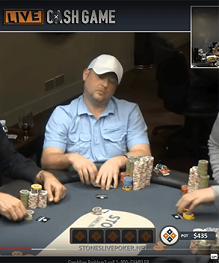On April 1, alleged poker cheat Mike Postle filed a voluntary dismissal motion in the Sacramento Superior Court where his $330 million defamation lawsuit was under consideration. The motion means Postle won’t be getting any of that money he might have dreamed of, though it’s not the end of the whole affair. There are still some legal matters to be dealt with.
First, there’s a tiny issue in the way Postle filed his motion, since it asks for dismissal “without prejudice”. That’s the legal way of saying that if his motion was granted as is, he’d be free to re-file an identical lawsuit almost immediately — according to one of the defense lawyers involved, he could file again in just 30 days.
So that’s not going to happen. Defense counsel for both poker players who actually bothered to defend themselves in this affair, Veronica Brill and Todd Witteles, have already announced that they will protest that part of the dismissal motion, instead asking presiding judge Shama H. Mesiwala to order the matter dismissed with prejudice, meaning Postle can never refile the claim.
You’re probably asking, “Why did Postle drop the suit?” Despite the fact that it was a trash lawsuit from the outset, done as a publicity stunt as much as anything, the larger truth is that Postle couldn’t find a lawyer to represent him — at least not on the contingency basis that Postle almost certainly desired.
Postle’s first attorney, Steven Lowe, is a respected attorney in defamation law, and he filed his own motion to dump Postle as a client some months back. (That motion was granted.) It’s telling that Postle could find literally no other attorney in the US. There were some unusual underlying circumstances that likely led Lowe to give it a whirl, eyeing that potential but unlikely $330 million payday, but once Lowe bowed out, Postle had few options. He could have hired an attorney and actually planned to pay him, and it likely would have required a six-figure investment. So, that wasn’t going to happen either.
Yet Postle had been something of an expert at receiving unofficial help. He received such help when he was on the defense, from a Sacramento criminal attorney. In the past few months he’d been getting help from a Connecticut group called the HONR Network, which was assisting Postle in his search for a new lawyer while unofficially helping Postle with some of those lawyerly needs.
The HONR Network’s involvement led the case down a strange rabbit hole. Who was this group, and why and how did they get involved? Once they were publicly exposed as working with Postle, the digging began. At first glance, it appeared to be a noble, white-knight sort of thing. The HONR Network was created by the father of the youngest child slain in the Sandy Hook Elementary massacre a few years back, and the group was founded to take on the challenges caused, most notably, by the vile far-right conspiracy theorist Alex Jones.
The HONR Network currently has a billion-dollar libel lawsuit against Jones in the court system, and most decent folk would frankly like to see them win and put Jones and his InfoWars crap out of business once and for all. Society would be better for it, if taken in a vacuum.
Yet that doesn’t quite explain the whole connection. It appears that in their deep searches for all things connected to Jones, HONR Network caught wind that one of Jones’ various attorneys, Marc J. Randazza, was involved in the case as Veronica Brill’s attorney. Randazza has appeared on Jones’ InfoWars programs on several occasions, though whether or not Randazza actually buys into Jones’ malarkey is less important — as Randazza tells it — then his being a defender of First Amendment rights and free speech. It’s kind of like the old pornography argument involving Larry Flynt, who described himself as “the worst of the worst” in terms of pornographic publishing, yet won his own First Amendment battles to keep on publishing. Replace Flynt with Jones and porn with overpriced dietary supplements and alt-right hate, and you’ve got the picture.
To me, Jones is the worst of the worst as these conspiracy theorists go. But whether his free-speech claims outstrip others’ right not to be defamed is another matter, and yes, it’s in the courts. We’ll find out in a few months, or years, how it all plays out.
Randazza, then, bills himself as a purist First Amendment-defending attorney, which means he’ll take on any client who can foot the bill. Randazza, though, is no stranger to controversy himself, having gotten into several regulatory scrapes with state bars over the course of his career.
The upshot of all this is that not only does the HONR Network really really hate Alex Jones, their people appear to have had some hate-by-association for Randazza as well. And that led them to first investigate the Postle case, then to reach out to Postle to help him. Not with regard to whether Postle was innocent or guilty of the poker cheating claims, but because Postle had, by several accounts, received multiple violent threats connected to his alleged cheating and the court cases that arose from the scandal.
Getting involved in this case for those reasons alone is… strange. Whether “vendetta” is the proper word here or not is up to the reader’s discretion.
What became public in March, however, was that the HONR Network was providing something approximating legal assistance to Postle, even though the group’s lead PR person, Alexandrea Merrell, declared otherwise. But all the attorneys involved on the defense side in the libel case decried Merrell’s and HONR Network’s involvement.
Witteles’ attorney, Eric Bensamochan, blasted Postle in a March 18 video court hearing for being supposedly unable to find an attorney, but being perfectly able to retain, in his words, a “PR firm” (meaning HONR Network). Postle never retained or paid HONR Network, though; the group jumped into this quagmire all on its own.
Via DM, Randazza shared with me his own take on HONR Network’s Merrell essentially acting as Postle’s attorney during pre-trial conferences. And later, Randazza sent me a statement from his associate, Alex Shepard, who also helped prepare Brill’s defense work in the case.
I was just getting ready to top off a story featuring Shepard’s statement as the centerpiece when Postle’s dismissal motion made the HONR Network’s involvement moot. Yet the statement — which may or may not have been submitted to the court as a protest against HONR Network’s excessive work, still deserves an airing, just because it illustrates what was really going on in March behind the scenes.
Here’s that statement:
- On March 17, 2021 at approximately 3:25 p.m. Pacific time, I called Plaintiff Michael Postle. Also on the line during this call was Alexandrea Merrell, the Director of Public Relations and Policy for the HONR Network.
- During this call, Ms. Merrell explained the services offered by the HONR Network. She explained the efforts Mr. Postle allegedly had made to retain counsel.
- During this call, Ms. Merrell also explained that the HONR Network was in the process of going through a large volume of statements allegedly published by Defendants in this matter about Mr. Postle to determine which statements were actionable. She stated that a 180-day continuance of the hearing on Ms. Brill’s Anti-SLAPP Motion was necessary due to how time-intensive this alleged search was.
- While I do not recall whether Mr. Postle or Ms. Merrell explicitly stated that Mr. Postle had retained the HONR Network, it was obvious to me during the course of this call that this was the case. I was convinced of this because Ms. Merrell did most of the talking during this conversation without objection from Mr. Postle and she was making representations on his behalf, such as his alleged efforts to retain counsel and the need for a continuance due to the HONR Network’s time-intensive efforts in obtaining examples of allegedly actionable statements. I do not find it remotely plausible the HONR Network would go through such efforts on Mr. Postle’s behalf without being retained to do so. (Author’s note: Shepard was incorrect on this last point.)
- During this call, I was also left with the distinct impression Ms. Merrell and/or the HONR Network was providing legal advice to Mr. Postle. By Ms. Merrell’s own admission, the HONR Network was collecting evidence of statements published online and advising Mr. Postle as to what statements were potentially actionable.
- Furthermore, Ms. Merrell was directly participating in a court-ordered meet and confer conference between me and Mr. Postle by explaining Mr. Postle’s alleged basis for seeking a continuance.
- Ms. Merrell also explained during this call that she had recently spoken to counsel for Defendant Todd Witteles, and represented to me that counsel for Mr. Witteles had agreed to a continuance of the Anti-SLAPP hearings of 90-120 days. She then stated that Ms. Brill should agree to a continuance of a similar length, and that if she refused to do so Ms. Brill would look unreasonable to the Court.
- I later learned that Ms. Merrell’s account of her conversation with Mr. Wittele’s counsel was a misrepresentation and that he had never agreed to such a continuance.
I declare under penalty of perjury that the foregoing is true and correct.
Shepard was trying to help Postle delay the hearing a second time to help him find a replacement lawyer, but Judge Mesiwala only granted a 33-day second continuance. And that was never going to be enough time for Postle to pull off the miracle he needed.
As to why the HONR Network was willing to abdicate the publicity high ground and enter the Postle case fray is something we’re likely never to know. Despite Merrell’s declaration that Postle received tons of online abuse — and that’s very true — he’s far from the first person to go through that. There are lots of people who suffer online bullying and defamation and other sorts of abuse.
Yet most of those other folks aren’t Postle. Whether it was a vendetta against Randazza or the hopes of gaining a slice of that fantasy $330 million judgment, there had to be some huge motivation for HONR Network to get involved. Otherwise it just didn’t make sense.
But that part of it is over, though the libel case’s endgame still remains to be played. What comes next is the resolution of the two anti-SLAPP motions filed by Brill and Witteles. With Postle’s voluntary dismissal in hand, Judge Mesiwala is likely to rule that his libel lawsuit was frivolous, a SLAPP (Strategic Lawsuit Against Public Participation) action designed to chill public commentary.
If the judge rules in Brill’s and Witteles’ favor, then Postle will be responsible to pay some or all of Brill’s and Witteles’ legal bills. Combined, that will likely reach six figures. While collecting such a judgment would be a separate concern, that’s now the likeliest scenario for how this case will come to a formal conclusion.

